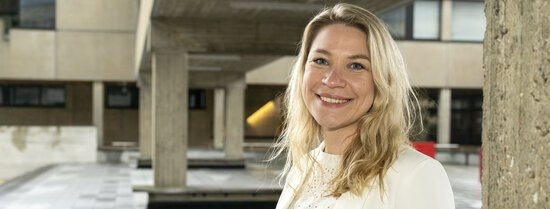In her first year of Psychology at Erasmus University Rotterdam, Daphne Pol was asked: 'What do you want to achieve in 10 years?' Searching for her concrete mission, she answered with the quote: I want to inspire people. I want someone to look at me and say: because of you I didn't give up. That quote gained extra meaning with the recently launched platform Samen Sterk tegen Dementie: 'I want to support and inspire informal caregivers, because the need for understanding and tools is high,' she observes as a psychologist in elder care and from her own experience.
Wanting to understand and help people has always been her motivation, says the healthcare psychologist in training. Yet Daphne never saw herself as a stereotypical psychologist in individual treatments. Unexpectedly, neurological subjects caught her attention during her Bachelor's degree in Psychology at the EUR: 'I found the medical side incredibly interesting, so I chose a master's internship in Medical Psychology at the Maasstad Hospital.' From a surprisingly dynamic field of work, she discovered how valuable it is to understand dementia better: 'I met patients for neuropsychological examination when dementia was suspected. To gain more insight into what goes wrong with dementia, I conducted research with the family members of these patients. My grandfather was struggling with dementia himself at the time, which triggered me extra to want to understand what happens in the brain.'
From passion to platform
Her passion for understanding dementia grew when she started working in elderly care three years ago: 'That first period was so educational and confrontational at the same time. Only there did I really learn what the disease entails, such as the phases people with dementia can go through. I already knew how to recognise symptoms in the early stages, but only now, in my work and private life, did I see how life with dementia continues afterwards. Daphne gained more knowledge and tools to deal with dementia that she wished she had earlier: 'Also for my own grandfather. Fear, sadness and lack of understanding often made me feel uncomfortable and disconnected from him. In hindsight, I would have liked to be there for him in a different way.'
Her idea for the platform was born: 'I notice a great need for conversation, information and practical tools among informal carers. It surprises me that loved ones often know little, while 290,000 people in the Netherlands are struggling with dementia.' Meanwhile, the number of elderly people over 75 will increase by 18% in 2040, while the number of informal carers will decrease from five to three per elderly person. Due to people living at home longer and a growing staff shortage in nursing homes, Daphne also sees that informal caregivers have to play an active role for an increasingly long time: 'The pressure on dementia care is increasing, so we must provide extra information and support to the informal caregivers available.'
Knowledge and connection for loved ones
Daphne independently developed the online platform Samen Sterk Tegen Dementie (Together Strong Against Dementia) to inform loved ones of people with dementia in an accessible way at one central point: 'It gives me so much energy when I notice that loved ones feel more relief, understanding and connection in this difficult illness process. In addition to knowledge, they especially need support and connection.' She wants the platform to be easily accessible to everyone: 'No long blocks of text with information, but also lots of videos, pictures and explanations. There are so many sources, and so much is being developed; as an informal caregiver, you just seem to have to find it all. This platform brings everything together.'
Route to my calling
In the meantime, Daphne already has future plans for the brand new platform: 'I hope that this platform will eventually also bring loved ones in contact with each other, because it is so helpful when someone understands how difficult or tough such an illness process is.' Unexpectedly, Daphne saw how her inspirational quote now has concrete meaning: 'When I was walking through Rotterdam again the other day, that quote suddenly popped into my head. As a student I didn't yet know exactly what I had with that quote, but now I feel from everything that I can inspire loved ones and contribute. How cool that these past years have ultimately brought me to my calling.'
Continuing to see a person
Daphne also sees how her studies have shaped her in her daily work: 'I have mainly learned to think critically and not to accept everything as the truth immediately. Especially within healthcare teams, people sometimes quickly think, 'this is how we always do it'. That scientific empirical cycle then helps me to continue researching.' Yet Daphne sees empathy as the most crucial development: 'I was talking about that with colleagues. I had to reflect endlessly during the study programme, and only afterwards you often see why. I learned then to really want to understand yourself and others. Now, when I see complicated problem behaviour in people with dementia, I want to know where it comes from. And that helps me to keep seeing the person behind it.'
- More information
This interview is part of Spark. With these interviews, we aim to draw attention to the positive impact of the faculty's education and research on society. The stories in Spark give an insight into what makes ESSB students, alumni, staff and researchers tick.
Contact: Marjolein Kooistra, communicatie ESSB, kooistra@essb.eur.nl
- Related education

